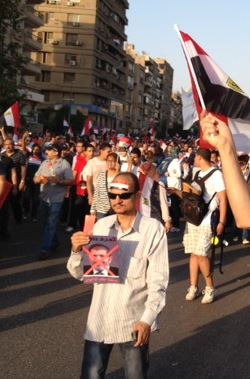
WASHINGTON (BP) — More than three dozen Egyptians are dead and 750-plus wounded after four days of demonstrations in Cairo, where millions successfully called for the ouster of President Mohammed Morsi.
Military, Muslim and Christian leaders and democracy advocates met July 3 to plan how Morsi will be replaced, the Associated Press reported.
“22 million Egyptian voter signatures are claimed to be on the petitions demanding the resignation of President Morsi,” said Mike Edens, professor of theology and Islamic studies at New Orleans Baptist Theological Seminary and former Cairo resident for 18 years. “That total number exceeds the number of people who voted in the presidential election last year. The rejection of Morsi and the Muslim Brotherhood [as a governing party] is broad-based and urban.”
Edens added that demonstrators are not limited to Christians, Shiite Muslims or other religious minorities, as “vast swaths” of Sunni Muslims also are demonstrating against Morsi, who is a Sunni Muslim.
“Maybe there is some hope after all in Egypt,” said Samual Tadros, the Hudson Institute’s Center for Religious Freedom research fellow. “An actual balance of power may be in the making, not in constitutional articles but on the ground. All parties need to recognize that the country is larger than them and a bit of humility on their parts is badly needed.”
Gathering since Sunday (June 30), demonstrators claimed that Morsi, who was elected in June 2012, is cause “for a breakdown in law and order, for an economy that’s gone south, and for a gas shortage that has Egyptians waiting at the pumps for hours,” CNN’s Salma Abdelaziz reported.
In addition to filling the streets, demonstrators torched the Muslim Brotherhood headquarters July 1, Abdelaziz said. The Islamic organization once was led by Morsi.
The AP reported that major demonstrations resumed in December — six months after Morsi become president — due to dissatisfaction over his governance.
With Morsi’s election came an expectation for “democracy and respect for human rights,” said two leaders of the United States Commission on International Religious Freedom in a mid-June statement. But the hope for greater freedom has faded in the past year, said chair Katrina Lantos Swett and vice chair Mary Ann Glendon.
“Among our concerns are Egypt’s new constitution, a code forbidding blasphemy, an impunity problem, restrictions on building places of worship and problems regarding religious identification and conversion,” Swett and Glendon stated. “While Cairo’s constitution affirms ‘freedom of belief,’ it mentions only the right to practice religious ‘rites’ and establish places of worship. It appears to limit even this narrow freedom to Egypt’s three ‘divine’ religions of Islam, Christianity and Judaism, excluding Baha’is, atheists and agnostics, among others.”
But Tadros added that even Egypt’s “divine” religion adherents face persecution, with four people being killed “just because they happened to be Shiite Muslims,” Tadros told The Wall Street Journal. “So it’s not now even about the Christians or the Jews … in the country, but even Shiite Muslims, Baha’is are feeling threatened by both the state of lawlesnness in the country and by the measure of state [control by] the Islamists and the kind of language and incitement they are using in those speeches.”
Under Morsi’s presidency, numerous churches continue to struggle with building permits, as the Egyptian government failed to approve any new church construction sites in 2012, the two USCIRF commissioners said.
Morsi did approve a Coptic church construction in June, Swett and Glendon said. But the church, located in northern Egypt, had waited 17 years for permission to build -– and construction has yet to begin. Some believe the approval was a false show of religious tolerance.
Less than a week after this decision, a Christian elementary school teacher in upper Egypt was convicted of defaming Islam in her classroom, despite a lack of evidence and the court’s refusal to allow witnesses, according to religious persecution monitor Morning Star News.
Dimyana Obeid Abd Al-Nour, a first-year teacher, was fined about $14,000 after three of her students claimed Al-Nour talked favorably about a former Coptic pope and made a derogatory gesture when mentioning Muhammad, Morning Star News reported.
The report stated that none of the three children’s testimonies matched. In addition, the other 10 students in Al-Nour’s class said she never mentioned the pope or Muhammad. Al-Nour remains in hiding due to Islamic protests against her.
Swett and Glendon of USCIRF encouraged the U.S. to act in ways to support religious freedom in Egypt, urging “the repeal of ‘contempt-of-religion’ laws and discriminatory decrees against religious minorities, the passage of a law of building and repairing places of worship and the removal of religion from identity documents.”
“[The U.S.] should press for prosecution of governmental-funded clerics, government officials and others who incite violence, while disciplining government-funded clerics who preach hatred,” the commissioners continued. “It should keep pressing Egypt to bring the violent to justice. And it should refuse to certify the disbursement of military aid until Egypt shows it is using funds for pro-freedom policies.”
–30–
Beth Byrd is a staff writer for Baptist Press. Get Baptist Press headlines and breaking news on Twitter (@BaptistPress), Facebook (Facebook.com/BaptistPress) and in your email (baptistpress.com/SubscribeBP.asp).

















